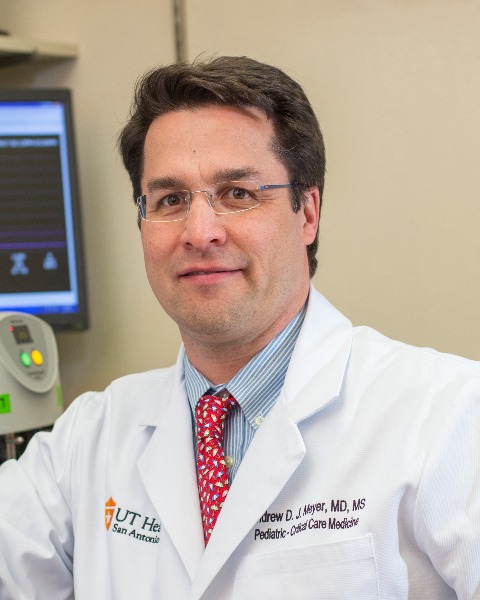
Andrew D. Meyer, MD, MS (he/him/his)
Associate Professor
UT Health Science Center At San Antonio
Dr. Meyer is a physician-scientist who integrates biomedical engineering and medical research to improve the lives of critically ill children. As a member of the UT Health Science Center (UTHSCSA) Pediatric Faculty, he sees young patients with congenital heart disease in the intensive care unit at University Hospital, the pediatric clinical partner of UTHSCSA. Dr. Meyer received his Bachelor of Science degree in nuclear engineering and material science and engineering, followed by a Master of Science degree in biomedical engineering. Dr. Meyer received the Doctor of Medicine (M.D.) degree in 2004, completed internship and residency training in internal medicine and pediatrics in 2008, and finished a clinical fellowship in pediatric critical care medicine in 2011. That year, UT Health San Antonio recruited him to the pediatrics faculty to teach, see patients and conduct research. Dr. Meyer then achieved new skills and knowledge in clinical research with a certificate in translational science (CTS) from UTHSCSA in 2016. Dr. Meyer has an active research program committed to decrease coagulation complications associated with critically illness. This research receives funding from the National Institutes of Health, American Heart Association, Children's Heart Foundation, and U.S. Army Institute of Surgical Research. Dr. Meyer has had an active research collaboration with the U.S. Army Medical Research and Development Command since 2013. Specifically, his lab evaluates novel anticoagulant therapies that reduce thromboembolic complications associated with life-saving devices, such as extracorporeal membrane oxygenation (ECMO) and cardiopulmonary bypass (CPB). Please visit www.meyermedicalresearch.org to learn more. In recognition of his excellence, Dr. Meyer received the 2017 Junior Distinguished Research Scholar Award, was promoted to associate professor of pediatrics with tenure at UTHSCSA in 2020, and became capability area manager of extracorporeal therapies for the Defense Health Agency (DHA) in 2022.
Poster(s):
-
Monday, January 22, 20249:00 AM – 10:00 AM MTSunday, January 21, 202412:15 PM – 1:15 PM MTSunday, January 21, 202412:15 PM – 1:15 PM MTSunday, January 21, 202411:00 AM – 12:00 PM MTSunday, January 21, 202412:15 PM – 1:15 PM MT
